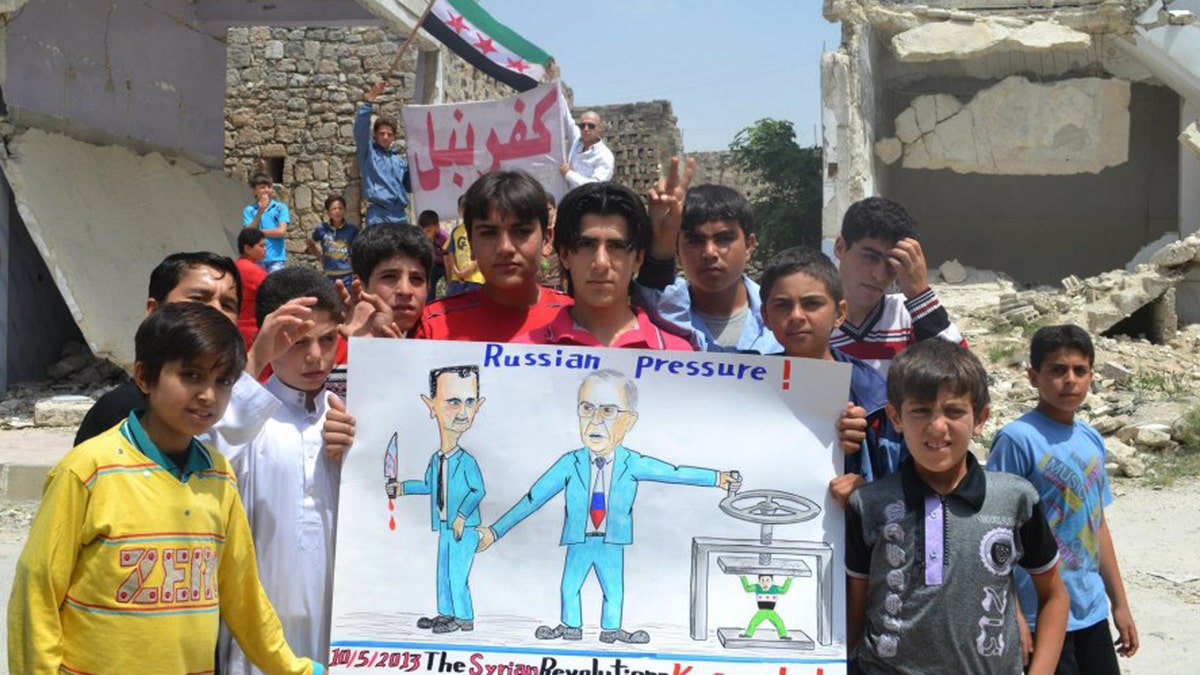
In this citizen journalism image provided by Edlib News Network, ENN, which has been authenticated based on its contents and other AP reporting, anti-Syrian regime protesters hold a poster depicting Syrian President Bashar Assad, left, and Russian Foreign Minister Sergei Lavrov, right, during a demonstration, at Kafr Nabil town, in Idlib province, northern Syria, Friday May 10, 2013. Arabic banner on the background reads, "Kafr Nabil." (AP Photo/Edlib News Network ENN) (The Associated Press)
BEIRUT – Syrian rebels cut on Saturday a newly built desert road linking the capital Damascus with the northern city of Aleppo, an activist group said, while the state media reported that government troops have secured the highway between the capital and the southern city of Daraa.
The reported fighting came as an activist group said U.S. ambassador to Syria Robert Ford, who left the country last year, met with a rebel commander at a border crossing point with Turkey.
The Aleppo Media Center said Ford met on Thursday with Col. Abdul-Jabbar al-Akidi, head of Aleppo province's rebel military council at the Bab al-Salama border crossing point. It posted a picture and a video of the two men standing on a road just a few meters (yards) outside a fence that appeared to be the border between Turkey and Syria.
The AMC quoted al-Akidi as calling on the U.S. to lift an arms embargo imposed on rebels.
The U.S. so far has balked at sending weapons to the rebels, fearing the arms could end up in the hands of al-Qaida-linked groups or other extremists in the opposition ranks.
Ford was in Turkey trying to get the opposition to commit to a proposal presented last year at an international conference in Geneva that involves talks with the President Bashar Assad regime.
The visit follows a decision by Russia and the U.S. this week to convene an international conference to bring representatives of the Assad regime and the opposition to the negotiating table. Such talks would aim at setting up a transitional government. No date has been set.
The plan, similar to the one set out last year in Geneva, calls for talks on a transition government and an open-ended cease-fire.
The regime and the Syrian opposition have welcomed the idea, but with conditions. The opposition says talks can only begin once Assad and his aides have left. The regime says it will keep fighting the rebels, without saying at which stage it would be willing to halt its fire.
In Egypt, the U.S. ambassador to Cairo met with Arab League chief Nabil Elaraby asking him to ask for Arab country's backing for the conference planned for this month.
In northern Syria, meanwhile, rebels took over two army posts on the desert road near the city of Aleppo after days of fighting, said Rami-Abdul-Rahman, who heads the Britain-based Syrian Observatory for Human Rights.
The regime built the desert road as a backup route after rebels captured the town of Maaret al-Numan in October cutting the main highway between Aleppo and Damascus.
Meanwhile, state TV said government troops were able to secure the highway linking Damascus with the southern city of Daraa, where the uprising against Assad's regime began two years ago.
The TV said troops killed "a large number of terrorists," the term it uses to refer to opposition fighters, in the town of Khirbet Ghazaleh south of Damascus.
The Observatory also reported clashes in the town of Qusair, near the border with Lebanon between rebels and troops and pro-government gunmen backed by Lebanon's Hezbollah group. It added that rebels attacked the village of Abel, near Qusair, and captured it after clashes that left seven soldiers dead.
Lebanon's state-run news agency said five rockets fired from the Syria struck near the town of northwestern Hermel without causing casualties. Hermel and nearby villages have been targeted by shelling from the Syrian side.
The fighting in the town came a day after U.N. commissioner for human rights Navi Pillay expressed alarm over Qusair, which has been besieged by Syrian troops for several weeks.
On Friday, the Syrian military dropped leaflets over Qusair, urging rebel fighters to surrender, but did not set a deadline for them to do so, according to the office of the Homs governor.
A Syrian provincial official in Homs said the rebels were given 24 hours to surrender starting 8 a.m. Saturday and calling upon residents in case they want to leave the city to use it southern entrance. He spoke on condition of anonymity because he was not authorized to speak to the media.
The conflict started with largely peaceful protests against Assad's regime in March 2011 but eventually turned into a civil. More than 70,000 people have been killed in the war, according to the United Nations.
